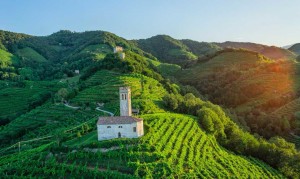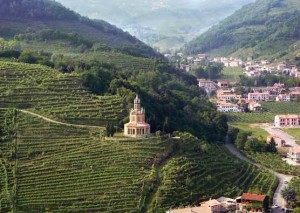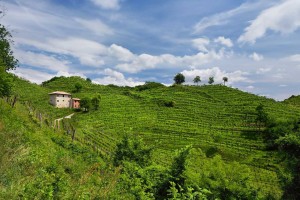Today we have a conference preview from Alan Tardi. Alan is an ambassador of Conegliano Valdobbiadene as well an a James Beard Award-winning author. Read on!
One of the things I love most about being professionally involved with wine (besides drinking it, of course!) is that no matter how much you know, there is always something new to learn and discover. Take Prosecco, for example, the quintessential Italian bubbly: Everybody in the wine-drinking world knows it — some even dink it on a regular basis without giving it a second thought. But most people, even many wine professionals, don’t really know that much about it, partly because they don’t even realize there’s much to know.
While everyone knows Prosecco, many don’t realize that there are actually three of them, much less what the differences are between them are. Prosecco DOC, created in 2009, encompasses a huge production area extending over two regions of northeastern Italy and accounts for more than 80% of all Prosecco produced. Colli Asolani Prosecco DOCG, also created in 2009, is a tiny area in the province of Treviso that was traditionally known for its still wines.
Conegliano Valdobbiadene Prosecco DOCG consists of 15 small municipalities in the hills about an hour north of Venice. Vines have been cultivated here for hundreds if not thousands of years, and this is where the wine we now know as Prosecco was originally born.
But that’s just the beginning.
The tiny growing area of Conegliano Valdobbiadene has an amazing diversity of terrior and microclimate, which you can actually taste in the wines, especially ones that are made from a single-village or vineyard. Besides the primary grape variety called Glera (formerly known as Prosecco), there are a number of other extremely interesting native varieties, which contribute unique character to the wines they show up in, even in very small quantities. While the vast majority of Prosecco is made sparkling in an autoclave (a technique that was perfected over a century ago for this area’s winemaking at the enology school in Conegliano), did you know that Prosecco can also undergo its second fermentation right in the bottle?
And did you know there’s a rare type of Prosecco that does not have any bubbles at all?
There’s actually a treasure trove of surprising things in Conegliano Valdobbiadene Prosecco just waiting to be explored, and that’s what we’re going to do in a session at this year’s SWE Conference called Way Beyond Bubbles: Terroir, Tradition and Technique in Conegliano Valdobbiadene Prosecco DOCG. (S1A)
Following a brief look at the history of Conegliano Valdobbiadene, the geological makeup of the area, and key features of the appellation, we will dive in to a comprehensive comparative tasting of 10 extraordinary wines in five flights of two that will demonstrate numerous unique features of Conegliano Valdobbiadene Prosecco including rare “Tranquillo’ (still wines), native grape varieties, single vineyard and single village designations (‘Rive’), autoclave vs. second fermentation in bottle (both in the classic method with disgorgement, and the traditional method with the yeasts still in the bottle), the influence of terroir on wine, and the impact of residual sugar and different ways to use it (or not).
Overall, this will be an eye-opening experience for any wine lover and a must for wine educators.
Look forward to seeing you in Portland!
Alan Tardi was named first ever US Ambassador of Conegliano Valdobbiadene in January 2015. His first book, ‘Romancing the Vine: Life, Love and Transformation in the Vineyards of Barolo’ (St Martins Press, 2006) won a James Beard Award for Best Wine and Spirits Book of 2006. And a new book, “Champagne, Uncorked: The House of Krug and the Timeless Allure of the World’s Most Celebrated Drink” (Hachette/PublicAffairs 2016) recently won a Gourmand Best in the World Award in the French Wine category.
Alan’s session, Way Beyond Bubbles: Terroir, Tradition and Technique in Conegliano Valdobbiadene Prosecco DOCG will be held on Saturday, August 12, 2017 at 8:45 am as part of the Society of Wine Educator’s 41st Annual Conference, to be held in Portland, Oregon.


